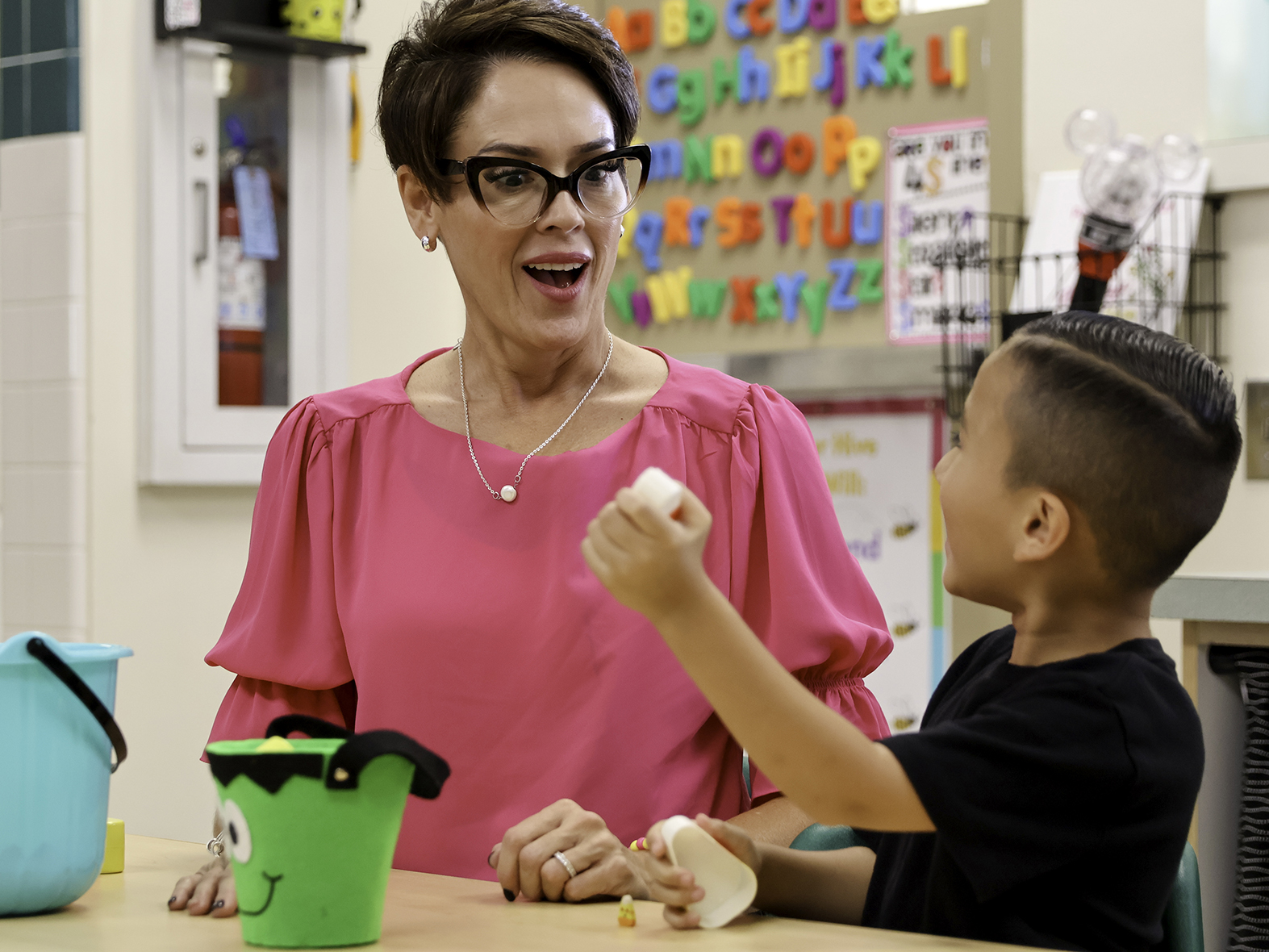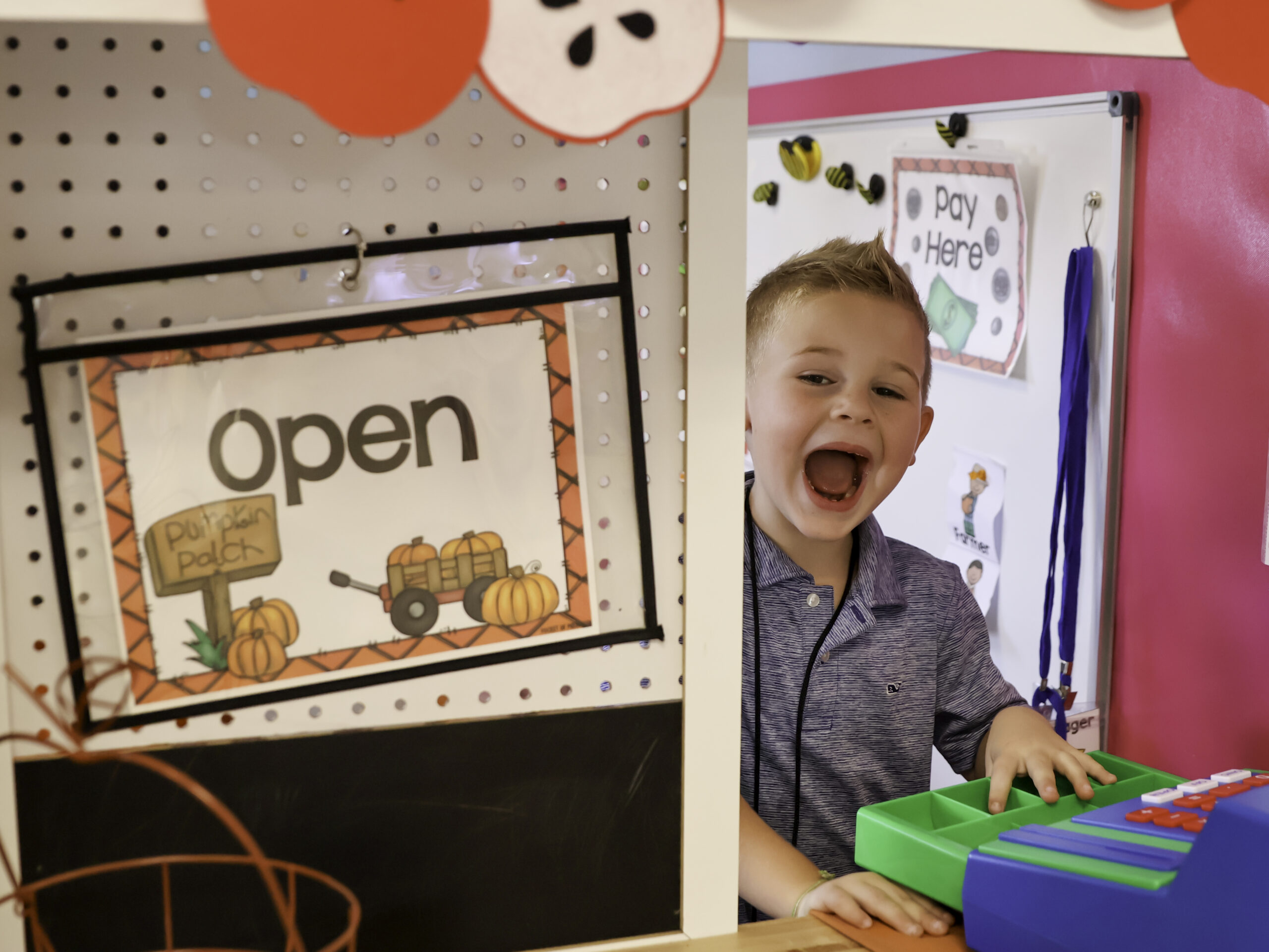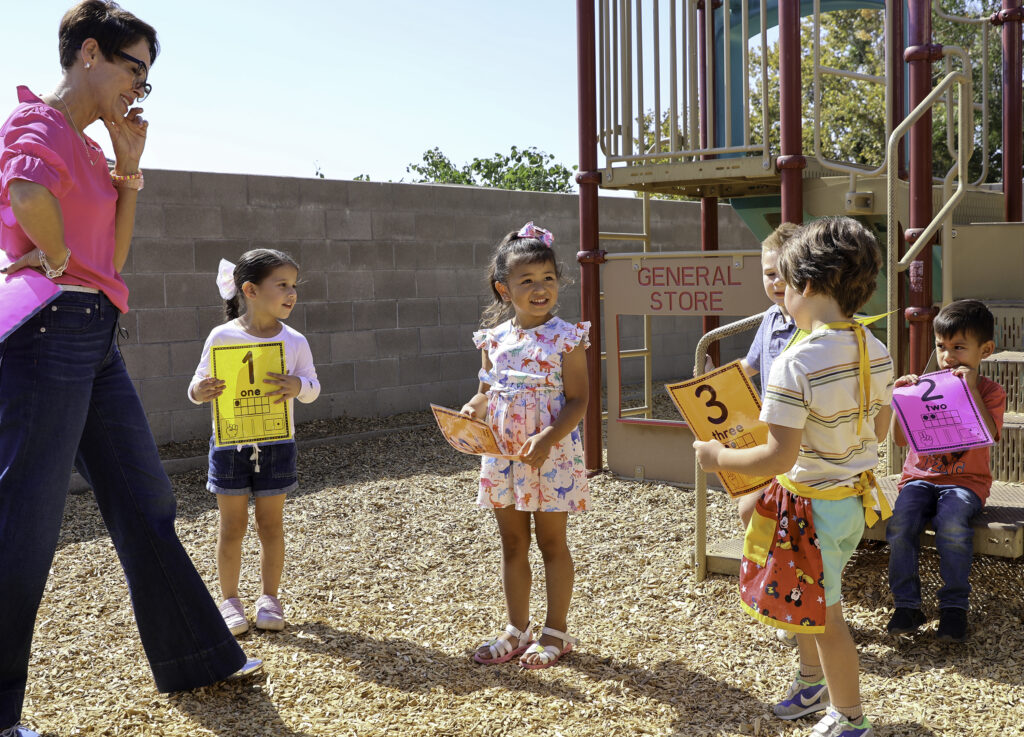
School District TK-3 Classrooms Showcase How Play is Shaping Future Learners
Friday November 8, 2024

In Mrs. Holladay’s transitional kindergarten (TK) class at Cesar Chavez Elementary in east Bakersfield, laughter filled the air on a recent October afternoon. Four-year-olds were fully absorbed — building towering block structures, brewing imaginary Halloween potions, and managing a pretend store. It might look like just another day of fun and games to an outsider. But these moments of play are shaping the minds of California’s youngest learners in profound ways, experts say.

As California gears up to offer an entirely new type of teaching credential geared toward pre-kindergarten through third-grade teachers, experts and educators alike are rallying around the idea that play is more than just a break from learning — it is the learning.
“When kids are playing, they’re naturally making decisions, solving problems, and negotiating with their peers,” said Ami Moser, coordinator for Universal Prekindergarten (UPK) and Early Education Supports at the Kern County Superintendent of Schools (KCSOS). “All of these actions are preparing them for real-world situations in ways traditional academics often can’t.”
Rolinda Salmon, a KCSOS program specialist for UPK and Early Education Supports, stressed the emotional and social aspects that play nurtures.
“Play provides children with a space to express their emotions, try on new roles, and engage in social interactions that develop empathy and emotional intelligence,” she explained.
She pointed out that when children feel emotionally secure, they are more open to learning and exploring, creating a positive feedback loop that fosters growth across all areas of development.
In early childhood, the brain is rapidly forming new connections, and play helps stimulate this development. Whether it’s a child sorting blocks by color and size or negotiating roles in a make-believe game, play is how children make sense of the world. Through these interactions, they begin to understand concepts like cooperation, cause and effect, and even early math and literacy skills.


California has specific requirements for TK teachers with an emphasis on early childhood development. For example, they are required to have the equivalent of 24 units of early childhood education or development, ensuring they are equipped to meet the needs of young learners through developmentally appropriate practices, including play-based lessons.
California also recently approved the new PK-3 Early Childhood Education (ECE) Specialist Instruction Credential, which emphasizes foundational knowledge in child development. CSU Bakersfield’s Teacher Education department, with help from its Child Adolescent & Family Studies undergraduate department, is currently developing its PK-3 credential program, as are many other universities around the state.
“If all goes as planned, our goal is to have an approved program by Fall 2025 and be enrolling students by Spring 2026,” said Robin Valente with CSUB’s Teacher Education Department.
Moser and her team see this as a positive shift.
“This credential ensures that teachers understand the developmental range of children from preschool through third grade, which will enhance the quality of education over time,” Moser said.
She is hopeful this shift will attract more teachers to specialize in early childhood education.
“I believe it will provide new on-ramps for aspiring teachers and help merge the early childhood and K-12 systems, ultimately benefiting both teachers and students,” she said.

Megan Gretona, school readiness manager at KCSOS and CPIN Lead for Region 8, noted that these new standards are part of a larger movement toward ensuring that early childhood education is more focused on nurturing the whole child, not just preparing them to meet academic benchmarks. Play-based education encourages creativity, curiosity, and problem-solving, all of which help children build a strong foundation for learning.
“In the past, kindergarten and early elementary classrooms might have focused more on structured learning, like sitting at desks and completing worksheets,” Gretona said. “Now we’re seeing classrooms that are vibrant and interactive, with play stations, group activities, and lots of movement. Kids are learning without even realizing it.”
For example, when children engage in imaginative play, they are practicing language skills by narrating stories and negotiating roles with their peers. Building with blocks or playing with puzzles helps them develop spatial reasoning, which is foundational for understanding geometry and problem-solving in later grades. A teacher might set up a pretend grocery store to teach counting and sorting or encourage children to build a bridge with blocks to explore basic physics concepts. These activities feel like fun but are deeply educational.
To further highlight the importance of play, and showcase practical applications in TK classrooms around Kern, KCSOS’s UPK team has partnered with Kern Education Television Network (KETN) to produce a video series titled “Purposeful Play in Transitional Kindergarten.” (see links below).
The project aims to provide educators, administrators, and parents with a quick overview of developmentally appropriate practices in TK classrooms. The videos cover topics such as integrated learning, language, math, science, and writing, and they illustrate how play can be a powerful tool for teaching these concepts.
“Every play-based interaction is a building block, a chance for each child to explore, imagine, and shape their world. This isn’t just early education. It’s the foundation of a lifelong love for learning,” Moser said.
Purposeful Play in TK Video Project

The Purposeful Play in TK video project has been developed to provide school administrators, teachers, and parents with a quick glance at developmentally appropriate practices in the Transitional Kindergarten classroom. While the videos highlight Transitional Kindergarten, the content is intended for all children of pre-kindergarten age.
Research has shown that through play, children learn social–emotional, cognitive, and physical skills that are essential in preparing them for later learning. The Purposeful Play in TK video project covers an array of topics and serves as a vehicle for understanding the importance of play based learning in the early education setting.
By Robert Meszaros
Rob Meszaros is Director of Communications for the Kern County Superintendent of Schools, where he has served since 2012. In his role, Meszaros oversees media relations, internal and external communication strategies, publications, Marcom, branding, and multi-media content creation. Before joining KCSOS, Meszaros was the PIO for CSU Bakersfield and earlier worked for seven years at The Bakersfield Californian.
